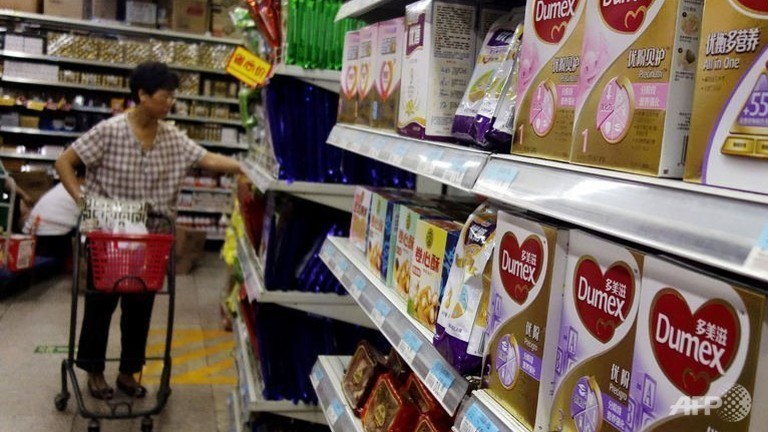New Zealand's 'clean and green' image hurt by milk scare
 Dumex baby formula from a batch that has been declared safe is pictured on shelves at a store in Beijing, China. (AFP/Wang Zhao) |
WELLINGTON - New Zealand has long marketed itself as "100 percent pure", but experts say that image is under threat amid fears of botulism contamination in its baby formula and other milk products.
The crisis gripping dairy giant Fonterra has implications for the entire country because of its importance to the economy and the damage being done to New Zealand's brand in China, its fastest growing export market, said communications expert Chris Galloway.
"New Zealand's image and that of Fonterra's can't be separated, they are intertwined," Massey University's Galloway told AFP. "Fonterra is our largest exporter and represents New Zealand in markets around the world.
"This crisis is a blow to our 100 percent pure branding and the repercussions might take some time to play out."
New Zealand largely shuns intensive farming methods and its cows feed on rolling pastures rather than feed lots, helping it foster a reputation for producing "clean, green" products.
The image is particularly valuable in Asia and especially China, where a series of food scandals have undermined trust in local products.
But Prime Minister John Key has acknowledged that New Zealand will face a tough task restoring confidence in markets such as China after a potentially deadly bug that can cause botulism was found in some Fonterra products.
While isolating the cause of the contamination, a dirty pipe in a North Island processing plan, and destroying the affected goods was relatively simple, Key said he feared the affair would damage international customers' perceptions of New Zealand goods.
"The risk is the consumers themselves saying, 'I'm wary of this now'... this goes to heart of undermining confidence," he told Radio New Zealand.
A clearly frustrated Key questioned why Fonterra took so long to sound the alarm, saying the company knew it could not afford to take risks with people's health.
Fonterra's CEO Theo Spierings, speaking at a news conference in Beijing, denied any delay. He insisted that the company had informed customers and the authorities within 24 hours of confirming the problem.
Galloway, who specialises in crisis communications, said the situation was all the more critical because it involved products aimed at newborn babies and it was not the first health scare Fonterra had been involved in.
"The repetition makes it harder for people to accept that this is an isolated incident," he said, referring to a 2008 scandal when six children died and more than 300,000 fell ill after China's Sanlu, which was part-owned by Fonterra, illegally laced milk with the chemical melamine.
No cases of illness have been reported in the latest contamination scare but Fairfax Media's Manawatu Standard, which covers the North Island's dairy heartland, said it appeared Fonterra had not improved its crisis management in the past five years.
"What is more worrying than the scare itself is the way Fonterra has handled it, appearing to learn little from the Sanlu melamine scandal of 2008," it said in an editorial.
Galloway said complete transparency was the only way for companies to deal with bad news, meaning Fonterra was struggling for credibility after being accused by the government of sitting on information about the contamination.
But branding expert Mike Lee from the University of Auckland said if foreign authorities were satisfied with Fonterra's actions following the scare, the company could recover.
"Demand (for milk) is outstripping supply basically," Lee told The New Zealand Herald.
"Obviously there has been a temporary loss in the share value of Fonterra but I think as long is this is something that they handle well (they could recover)."
What the stars mean:
★ Poor ★ ★ Promising ★★★ Good ★★★★ Very good ★★★★★ Exceptional
Latest News
More News
- Russian President congratulates Vietnamese Party leader during phone talks (January 25, 2026 | 09:58)
- Worldwide congratulations underscore confidence in Vietnam’s 14th Party Congress (January 23, 2026 | 09:02)
- Political parties, organisations, int’l friends send congratulations to 14th National Party Congress (January 22, 2026 | 09:33)
- 14th National Party Congress: Japanese media highlight Vietnam’s growth targets (January 21, 2026 | 09:46)
- 14th National Party Congress: Driving force for Vietnam to continue renewal, innovation, breakthroughs (January 21, 2026 | 09:42)
- Vietnam remains spiritual support for progressive forces: Colombian party leader (January 21, 2026 | 08:00)
- Int'l media provides large coverage of 14th National Party Congress's first working day (January 20, 2026 | 09:09)
- Vietnamese firms win top honours at ASEAN Digital Awards (January 16, 2026 | 16:45)
- ASEAN Digital Ministers' Meeting opens in Hanoi (January 15, 2026 | 15:33)
- ASEAN economies move up the global chip value chain (December 09, 2025 | 13:32)
















 Mobile Version
Mobile Version